Trump Foundation hits back at 'political motivations' of New York attorney general's lawsuit
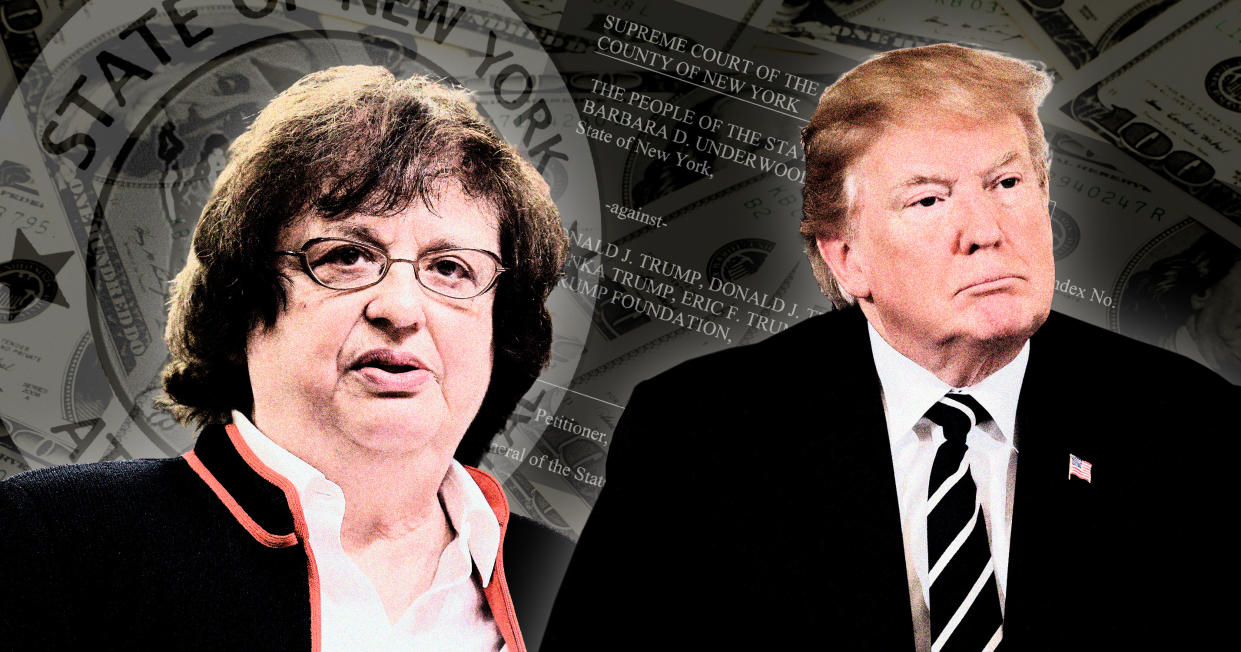
WASHINGTON — President Trump went on the offensive on Thursday after New York state Attorney General Barbara Underwood filed a lawsuit against him for an alleged “pattern of illegal conduct,” including “willful self-dealing” at his charitable foundation. In a pair of tweets posted shortly after the suit was announced, Trump dismissed it as a “ridiculous case” brought by “the sleazy New York Democrats” and vowed that he will not settle the case.
The suit, which names the president, the Donald J. Trump Foundation, and his three oldest children, who are all on the charity’s board, said the organization repeatedly engaged in the “misuse of charitable assets for the benefit of Donald J Trump … and his personal, political and/or business interests.” It is the culmination of an investigation that began in 2016. The suit asks for the foundation to be dissolved, for the board members to be blocked from being directors “of any not-for-profit authorized by New York law,” and for restitution and penalties. In a statement, Underwood vowed to hold the foundation and its board “accountable for its misuse of charitable assets.”
“As our investigation reveals, the Trump Foundation was little more than a checkbook for payments from Mr. Trump or his businesses to nonprofits, regardless of their purpose or legality,” Underwood said.
In response to the lawsuit, the foundation released a statement accusing the New York attorney general of “playing politics and nothing more.” The statement suggested that Underwood, who is a Democrat, was trying to distract from President Trump’s summit with North Korean Leader Kim Jong Un, which took place on Tuesday, and the release of an internal report on the FBI’s 2016 investigations of Hillary Clinton and of Russian influence in the U.S. presidential election. The report was critical of former FBI Director James Comey, a frequent Trump target, and other FBI officials.
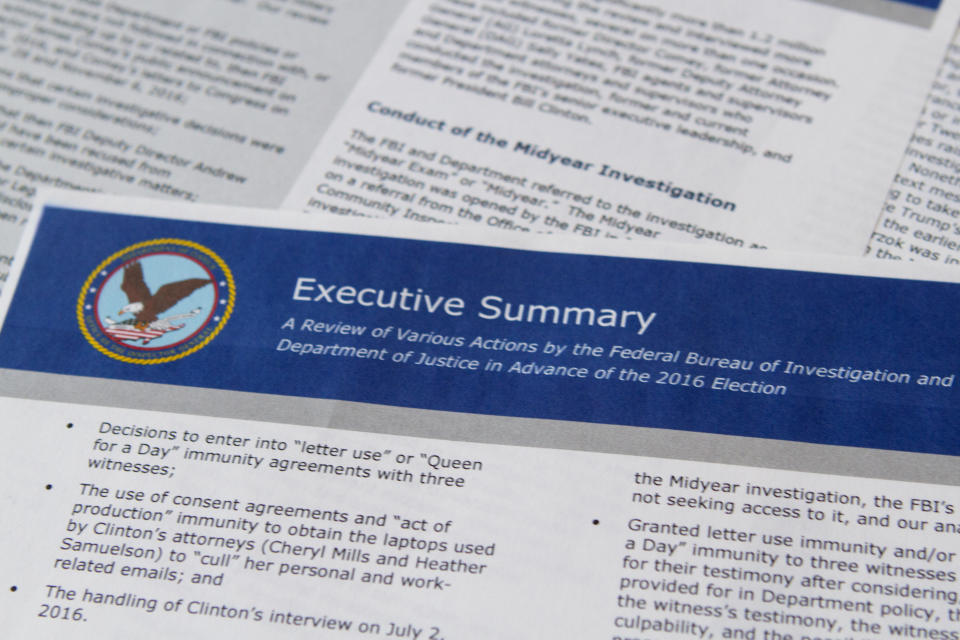
“The political motivations behind this are made all the more obvious,” the Trump Foundation statement said, citing the “NYAG decision to file this petition on the very day of the issuance of the Inspector General’s Report on the Hillary Clinton e-mail investigation; and on the heels of an historically successful diplomatic mission abroad.”
The New York lawsuit claims the foundation’s board engaged in a “breach of fiduciary duties” by failing to hold meetings or financial reviews, as required by law. While the foundation was incorporated in 1987, the suit claims that the board “had not met since 1999” and that Trump essentially ran the foundation and drew up checks on his own. The suit argues that this lack of oversight allowed Trump to “misuse charitable assets” and that board members are legally liable for their conduct.
According to a 2016 report by the New York Times, the only other person on the board besides the four Trump family members was an unnamed employee of Trump’s real estate company. The other director was not named in the suit.
“The foundation is little more than an empty shell that functions with no oversight by its board of directors,” the suit contends.
Additionally, the suit claims the Trump Foundation “diverted charitable assets for improper or unnecessary purposes,” including advancing Trump’s political career and settling claims against his businesses. The third and final claim in the suit is directed at Trump alone, accusing him of violating a rarely used New York law that bars nonprofits from engaging in transactions that could benefit board members without a review.

The suit focuses heavily on a veterans’ fundraiser Trump held in Iowa on Jan. 28, 2016, days before caucuses in that state that were the first nominating contest of the presidential campaign. Trump announced the event after he declined to participate in a presidential debate because he believed the moderator, former Fox News anchor Megyn Kelly, was biased against him. Instead, Trump said he would host the alternate event to raise money for veterans.
According to the attorney general’s lawsuit, Trump’s presidential campaign “extensively directed and coordinated” the Trump Foundation’s participation in this fundraiser.
“The Board knowingly permitted the Foundation to be co-opted by Mr. Trump’s presidential campaign,” the suit says of the event.
The lawsuit details how Trump campaign staff determined which charities should get the approximately $5.6 million that was raised through the event. It cites an email from Trump’s former campaign manager, Corey Lewandowski, in which he directed the foundation to “make grants in Iowa right before the February 1, 2016 Iowa caucuses.” The suit also details instances when the foundation permitted Trump to present large novelty checks to veterans’ groups at campaign rallies using funds raised at the event and described this as Trump using the donations to “advance his political goals.” Because Trump touted the gifts on the campaign trail, the suit argues that the charity’s involvement amounted to in-kind campaign contributions.
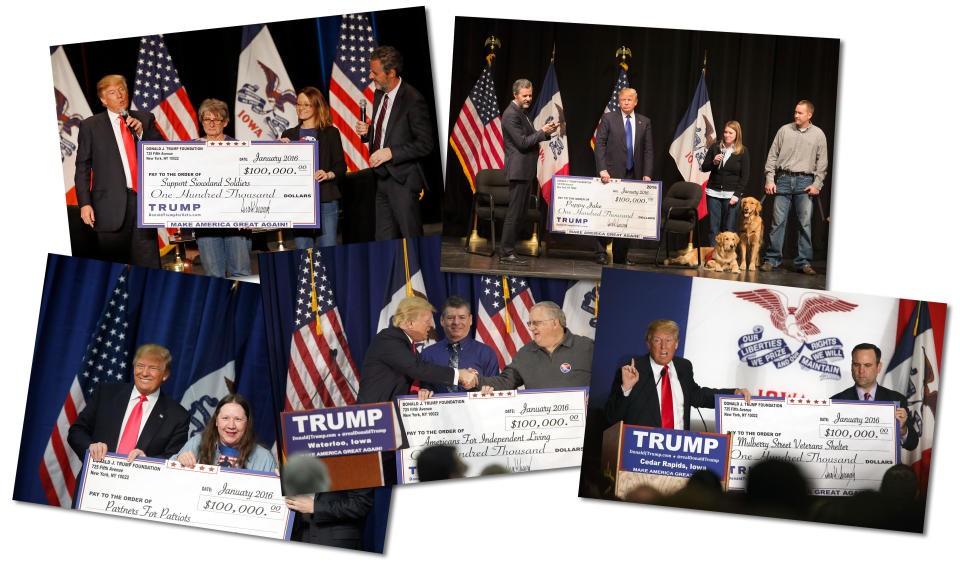
Trump’s foundation fired back with its own allegation that the New York attorney general’s office is trying to score political points with the suit, singling out Underwood’s predecessor, Eric Schneiderman, who resigned as New York’s attorney general last month after multiple women accused him of abusive behavior. The statement noted that Schneiderman was on the Clinton campaign’s “leadership council” in 2016. It also cited numerous public statements he’d made and public fundraising appeals by his reelection campaign in which Schneiderman promised to “fight the Trump Administration’s destructive policy agenda.”
“The disgraced former AG focused the considerable powers of his office to further his own political agenda and his political vendetta against President Trump,” the Trump Foundation statement said.
Amy Spitalnick, a spokeswoman for the attorney general, rejected the foundation’s charge that the suit was “politically motivated.”
“AG Underwood believes that anyone who breaks our state’s charities laws should be held accountable, no matter their position,” Spitalnick said.
Schneiderman first took on Trump in 2013 when he sued the future president for fraud over the running of Trump University, a real estate seminar series that the former attorney general described as a “sham.” Trump paid $25 million to settle that suit as well as a separate lawsuit filed by former students. After Trump took office, Schneiderman filed a flurry of lawsuits against his administration over various regulatory decisions and executive orders on immigration and other matters. Since Schneiderman’s departure, Underwood has aggressively continued his efforts to push legislators to close what she has described as a “loophole” in New York to allow prosecution in state courts of people who have received pardons for crimes tried under federal law. The purpose would be to ensure that Trump’s inner circle cannot escape justice for possible felonies through a pardon by the president.
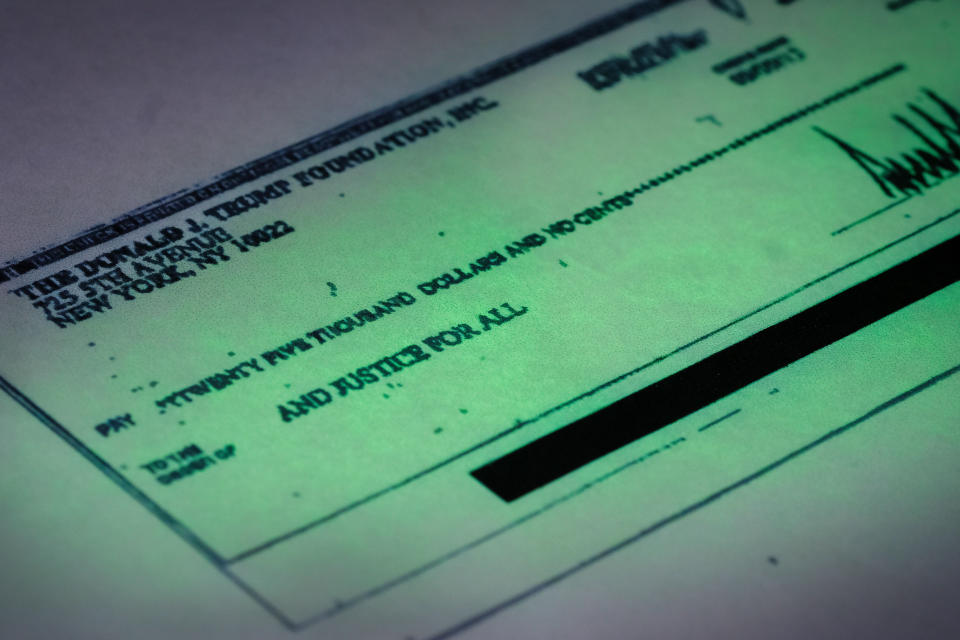
Several specific donations made by the Trump Foundation were cited in Underwood’s suit, including a $25,000 payment made in 2013 to a political organization backing Florida Attorney General Pam Bondi. At the time, Bondi was reportedly investigating Trump University. Bondi personally solicited the donation, and after the payment was received, she denied that an investigation had been underway. The lawsuit accused the Trump Foundation of not disclosing the contribution on its 2013 tax return and instead listing a false contribution to a nonprofit with a “similar name.” According to the suit, the foundation had “no credible explanation” for this “false reporting.”
The Trump Foundation’s payment to the pro-Bondi group was publicly revealed in March 2016 when the watchdog group Citizens for Responsibility and Ethics in Washington filed a complaint with the IRS about the donation and inaccurate tax filing. Trump reimbursed the foundation and paid associated taxes one day after the complaint was reported by the Washington Post.
Underwood’s lawsuit also cites five other payments made by the foundation totaling about $305,000 as examples of “prohibited self-dealing” that benefited Trump. According to the suit, all of these payments were reimbursed with interest “after the commencement of the investigation” into the Trump Foundation.
One of these payments was a 2007 gift of $100,000 that was made to another charitable organization to settle legal claims the city of Palm Beach, Fla., had made against Trump’s private club there. The suit also notes that the charity paid about $158,000 in 2012 to the foundation of Martin Greenberg, who had sued Trump’s Florida golf club and other organizations associated with a charitable golf tournament that promised contestants could earn $1 million by hitting a hole in one. Greenberg hit the rare shot, but the organizers said he was not at the required distance. His suit was settled for $775,000, including a portion from Trump’s club.
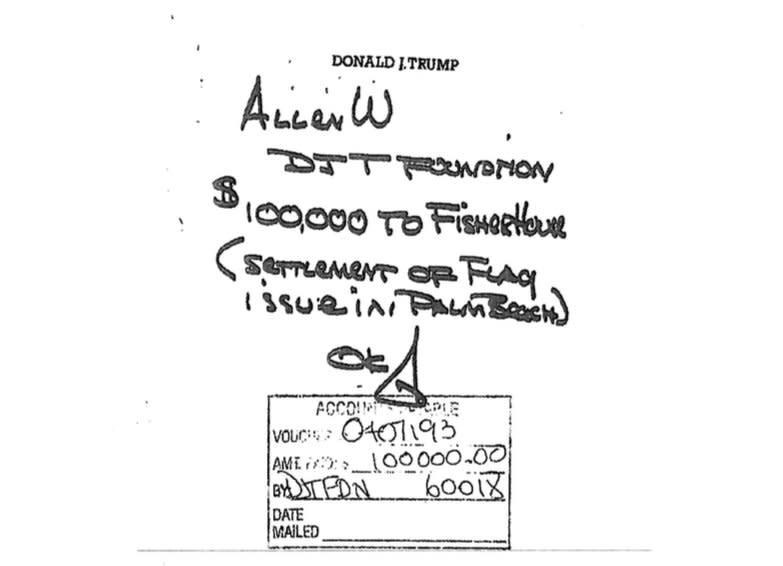
Along with the money stemming from these settlements, the attorney general’s suit said the Trump Foundation paid $5,000 to another charity in exchange for ads promoting Trump’s hotels that appeared in the printed programs at fundraisers and $32,000 to a land trust. A separate entity owned by Trump had donated land to the trust, and the money was to be used to maintain the property. The suit argues that those funds should have come from the entity that donated the land rather than the foundation.
Lastly, the suit said the Trump Foundation gave $10,000 in 2014 to Unicorn Children’s Foundation for a portrait of Trump that was purchased at an auction for that charity. The suit alleged that the painting was hung at a Trump-owned resort in Florida. Washington Post reporter David Fahrenthold, who has extensively covered issues related to Trump’s charity, previously documented how the president purchased a portrait for himself at a Unicorn Children’s Foundation auction in 2014. Trump and his wife, Melania, also purchased a painting of themselves at a Unicorn Children’s Foundation event, and the painting was presented to them in 2007.
The Trump Foundation’s statement said that, over the years, the organization had received $18.8 million in donations, including $8.25 million that came from Trump or businesses he owned. According to the foundation, it had plans to distribute $19.2 million to various charitable causes.
“The Foundation was able to donate more money than it received because it had virtually no expenses, no paid employees, and no overhead,” the statement said, adding, “This stands in sharp contrast to many other foundations.”

The Trump Foundation was based in the Manhattan headquarters of Trump’s real estate company. It employed accountants from that firm. The foundation said $1.7 million in planned donations to various charities is being “held hostage” by the attorney general’s office. In late 2016, shortly after he was elected, Trump said he would dissolve the foundation to avoid any conflicts of interest. However, the New York attorney general’s investigation had already commenced, and the foundation was blocked from dissolving while that probe continued.
“Once the NYAG release the hostage $1.7 million, the foundation stands ready to make donations,” the statement said.
A source close to the president expressed dismay over the lawsuit.
“How can a foundation that has no expenses be attacked like this, where every dollar went to incredibly worthwhile causes?” the source asked.
The source echoed the claim that the suit was politically motivated and noted that, like Schneiderman, Underwood has vowed to take on Trump, and also expressed concern that the suit was filed Thursday, which they noted was the day of the FBI inspector general’s report and the president’s birthday.
“Nothing’s out of bounds for these people,” the source said.
_____
Read more from Yahoo News:
Obama official: ‘We should have done more’ on Russian interference in 2016 election
Sage grousing: Senators charge Interior is holding up conservation grants
California’s Gavin Newsom wants to lead the way to a post-Bernie, post-Hillary party
The 8th Circuit strategy: How abortion foes are lining up cases to challenge Roe

